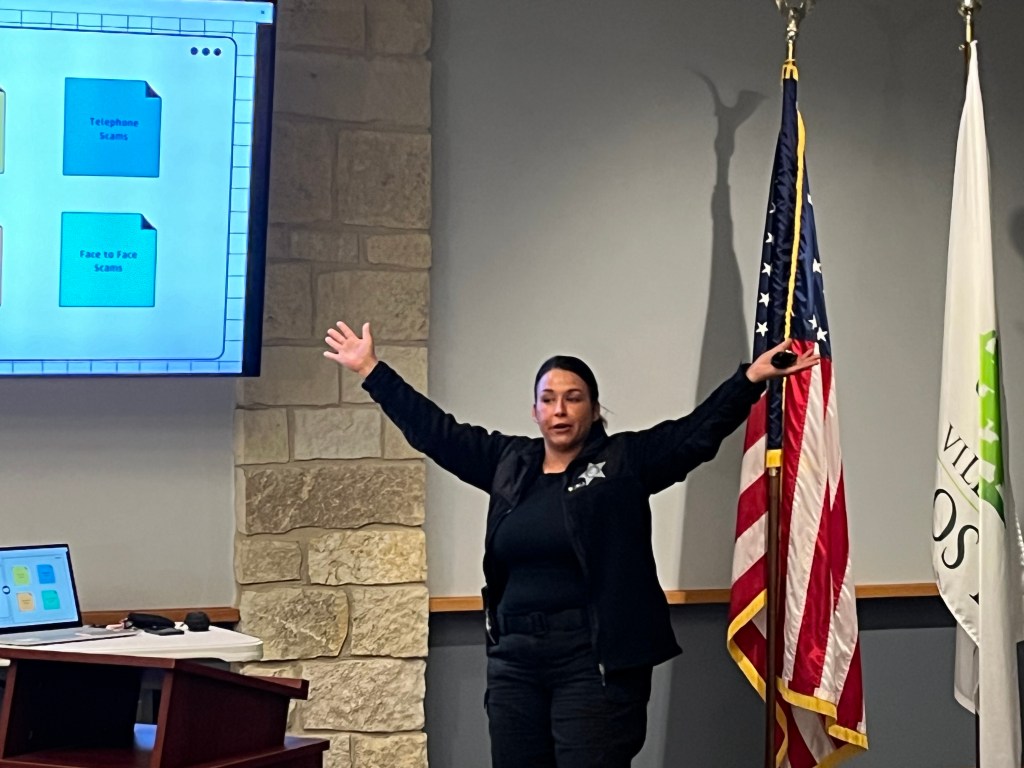Communities across Illinois came together Tuesday for National Night Out, participating in events organized by police departments to strengthen connections between officers and the residents they serve. In Palos Park, the police invited residents to learn about scams targeting seniors Tuesday.
“Our elder community sometimes makes the best victims, because they comply, they become afraid and then they don’t want to come forward because they become so embarrassed,” said investigator Danielle Scaccia.
Police Chief Joe Miller said the department has organized scam awareness events for several years, consistently working to educate residents about potential scams and provide strategies for avoiding them. Miller said these efforts are especially important in Palos Park, where the predominantly senior population is particularly vulnerable to such schemes.
“We do it pretty regularly because we have a large, wealthy elderly population here. A lot of people here never leave, they grow up here,” he said.
The departments warnings come after the FBI released its annual Elder Fraud Report in April that found scams targeting individuals aged 60 and older caused more than $3.4 billion in losses in 2023 — an 11% increase from 2022. The average victim of elder fraud lost $33,915 in 2023, the report states.
The report found many scams go unreported, specifically those targeted at the elderly community. Scaccia reinforced this point during her presentation and urged residents to trust their instincts.
“I know sometimes it’s hard and you don’t know, but there’s that voice telling you it’s like something feels off, listen to it, because nine times out of ten it’s going to tell you the right thing,” she said.
Miller said the community has experienced substantial losses due to scammers. Most recently, a woman lost all her jewelry after falling victim to someone who showed up at her doorstep claiming to offer a service. While distracted, another person went inside her home and stole her valuables.

Miller explained this type of scam is prevalent. People often go door-to-door offering discounted rates for roof repairs, driveway resurfacing or other services if paid in cash upfront. While the resident goes inside to get the cash, an accomplice enters the home, he said.
Another common scam seen is what officers called a “grandparent scam.” These are typically carried out over the phone by people claiming to be a relative of the victim, usually a grandchild claiming to be in urgent need of money because they were arrested and need to make bail.
The scammers ask for cash and then send an associate who poses as a police officer, a bondsman or other official to collect the money.
Miller said many victims stay quiet about the transfer to protect the grandchild they were led to believe is in trouble, not realizing the fraud until later.
“They’re afraid to reach out to their child and say ‘hey, your son’s in jail,’ they just want to help the kid,” he said.
To avoid falling victim, Scaccia told residents to verify a caller’s identity and the legitimacy of their story.
Lifelong Palos Park residents Carol Anderson and Vanetta Wiegman, though not victims themselves, attended Tuesday so they can help others avoid falling prey to scams.
“When you come to something like this, then you can tell…everybody what’s going on,” Wiegman said.
Anderson expressed her appreciation for the department’s efforts to keep residents informed about new schemes and attended to stay updated herself.
“I wanted to hear about the latest scams, and we should know what’s going on in the village,” she said.
Scaccia said scams are becoming harder to detect.
People now use artificial intelligence to mimic voices or craft convincing letters pretending to be sent from official organizations or businesses.
Identifying door-to-door scammers has also become increasingly challenging, Scaccia said, as many wear face masks that residents often dismiss as a precautionary measure.
Officers warned people may also pose as police officers or lawyers who claim to represent the family member. If ever uncertain, investigator Danielle Scaccia said people should call the department.
Scaccia said scammers may also spoof phone numbers of the FBI or police departments.
Spoofing, she said, occurs when a caller manipulates their phone number to make it appear on a victim’s caller ID as though the call is coming from a different person or organization.
The department urges residents to be cautious about what they share online and always be aware of their surroundings. If residents have any doubts about potential scams, Scaccia said to call the police department.
“Not every person out here is out to scam you. A lot of them, a lot of them aren’t, but you know, given the times right now, people are struggling. Pay attention to your surroundings,” she said.\
Originally Published:

